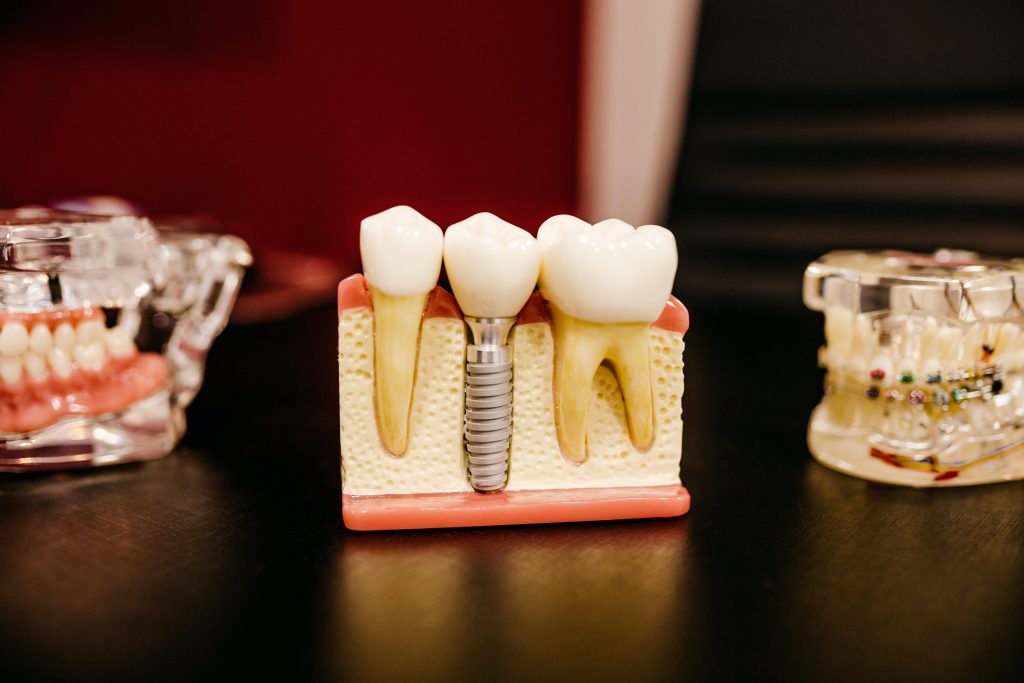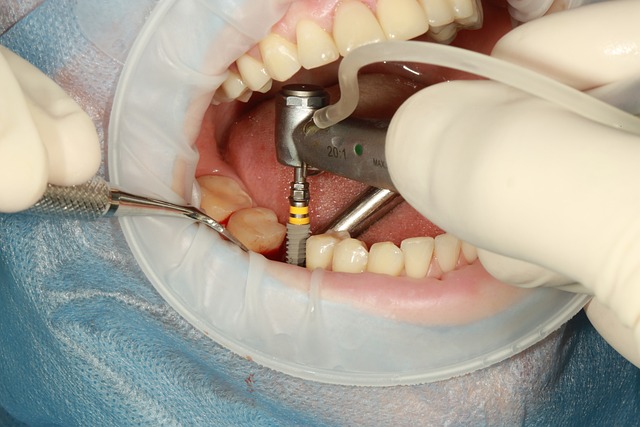
Show the clinics offering Dental implants
Dental Implants - What are they?
 Simply put, a dental implant is a metal screw or scaffold that is embedded into the jawbone, becoming part of the jaw and supporting a tooth imitation (called a crown). The screws themselves are harmless and do not cause any discomfort. Patients quickly forget. As artificial teeth, crowns are usually made of porcelain, ceramic, metal, zirconium and even gold. Some grow up and replace their teeth with gold, while others look for beautiful imitations of cracked, destroyed or lost teeth and choose zirconium that best matches the color of their natural teeth. Dental implants mimic natural teeth in color, hardness and function. With proper care, it can last a lifetime. Imagine being able to finally enjoy crispy meats and hard foods after the daily struggle of eating without teeth.This is why dental implants are so practical. Many people wonder how this is possible. Now let’s take a closer look at the whole process.
Simply put, a dental implant is a metal screw or scaffold that is embedded into the jawbone, becoming part of the jaw and supporting a tooth imitation (called a crown). The screws themselves are harmless and do not cause any discomfort. Patients quickly forget. As artificial teeth, crowns are usually made of porcelain, ceramic, metal, zirconium and even gold. Some grow up and replace their teeth with gold, while others look for beautiful imitations of cracked, destroyed or lost teeth and choose zirconium that best matches the color of their natural teeth. Dental implants mimic natural teeth in color, hardness and function. With proper care, it can last a lifetime. Imagine being able to finally enjoy crispy meats and hard foods after the daily struggle of eating without teeth.This is why dental implants are so practical. Many people wonder how this is possible. Now let’s take a closer look at the whole process.
What can you expect from a dental implant procedure?
- Examination, X-ray, Imaging
- tooth extraction
- Bone graft or sinus lift – as needed
- Insertion of dental implants and healing rings
- Attaching the crown
Between these steps, there is time for the gums and jawbone to heal, and it will take at least several months to complete the process.
How does a dental implant work?
 The post-extraction hole serves as a suitable attachment point for the implant (screw). The implant is carefully placed into it and left to heal the surrounding bone and gum tissue. A so-called abutment is necessary to fix the implant and allow it to be exposed in the future. Once the bone and gum tissue have healed properly, usually after about 3-6 months, the implantologist can expose the screws and finally attach the crown to the implant, completing the whole process. Dental implants are considered a safe medical procedure with a high success rate. It’s been around the world for over 50 years, so don’t stress it out. After that, the remaining natural teeth will begin to fade, with the exception of the custom-made crown. The entire procedure, from screw insertion to crown installation, requires at least 3/4 visits to the clinic and 3-6 months to complete.
The post-extraction hole serves as a suitable attachment point for the implant (screw). The implant is carefully placed into it and left to heal the surrounding bone and gum tissue. A so-called abutment is necessary to fix the implant and allow it to be exposed in the future. Once the bone and gum tissue have healed properly, usually after about 3-6 months, the implantologist can expose the screws and finally attach the crown to the implant, completing the whole process. Dental implants are considered a safe medical procedure with a high success rate. It’s been around the world for over 50 years, so don’t stress it out. After that, the remaining natural teeth will begin to fade, with the exception of the custom-made crown. The entire procedure, from screw insertion to crown installation, requires at least 3/4 visits to the clinic and 3-6 months to complete.
A candidate for dental implants
The best candidates for dental implants are those who have mature jawbone (adult) and are particularly healthy with respect to teeth, root canals, gum tissue, and (adequate) bone structure. Suffering from periodontal disease may disqualify you from being a potential candidate. The same is true for patients with malocclusions who need treatment before implants can be inserted. Problems can also arise when a root canal infection spreads to the bone and interferes with the bone’s natural ability to regenerate. Also, after major surgery that takes a long time to heal, patients may be advised to wait until they are fully recovered before major surgery. But if you haven’t had surgery like this recently, and you feel great, you don’t lose your teeth naturally, and you don’t scare people because of your protruding fangs, then yes, you are in for surgery. The ideal candidate is indeed a dental implant. Remember that smoking slows down your body’s healing process. By then, stop smoking and keep smoking until the incision, gums, jawbone, and implant are all bonded.
Putting in a few implants does not immediately solve the most common dental problems that may occur in other teeth in the future. Proper hygiene is important.Some patients may need to undergo complex treatments before they can place an implant. Bites should be braced with metal or Invisalign braces, and people with gum disease, such as mild gingivitis, should practice good oral hygiene, a soft-bristle toothbrush, mouthwash, dental floss, and regular maintenance. It is necessary to repair the gum tissue with a regular dental check.
Advantages and risks of Dental Implants
Before planning any dental treatment for your jaw you should know the advantages and disadvantages of dental implants. It’s easy to think you look good and your co-workers will die of jealousy, but dental implants have benefits beyond looks. Conversely, they should not be underestimated.
Advantages of dental implants include:
- natural look
- Long-lasting, some last a lifetime
- To finally be able to eat all food without problems
- improve language skills
- regain confidence
- Implants prevent bone changes in the face, cheeks and jaw
- A Safe and Reliable Choice in the Implant Market
- A great, often ideal, aesthetic effect and perfect smile restoration
Dental Implant Issues – What are the risks of dental implants? The disadvantages of dental implants should also be considered:
- Long process of installation – requires patient patience
- Complications such as infections are possible and may require dental treatment of the jaw
- Healthy teeth may be extracted unnecessarily
- Some procedures can be expensive and are usually not covered by insurance
- May cause allergies
Dental implant surgery has the following risks:
- bone loss, fractures,
- Perforation
- sinus problems
- nerve damage
- Implant failure in the form of lack of stability or implant rejection (very rare)
- All of these post-operative dental implant complications must be monitored and treated by a professional to repair possible damage.
Dental implant abroad - cost
Interestingly, using dental implants abroad can save you up to 50% or even 60% of the cost. These days, cheap dental implants are available in Turkey, India, Thailand and Mexico. Check out the cost of full implants, abutments and crowns in these exotic countries below. The table below shows prices for a full set of implants with crowns, not just implants or crowns.
How much does a dental implant cost abroad?

From this, it can be easily deduced that the price mainly depends on the cost of living and the brand of dental implant. However, if you live in Europe or the Middle East and dream of the safest and fastest method of round-trip medical travel, you should focus on Eastern European countries where you can find the best quality-price ratio. Additionally, flights to these countries are often offered by low-cost airlines, so it’s common to find very cheap round-trip tickets to any of the following locations.

It is worth considering why the above countries offer cheap dental implants. It’s not primarily a material factor. The materials used are almost identical to those found in local clinics in the UK or USA. High-tech imaging equipment costs about the same to purchase and maintain.Also, the cost of manufacturing dental implants is very similar regardless of location. Only the cost of professionals varies from country to country, which can lead to cheaper deals.Why is this the case? Is it because overseas clinics have lower standards? You might be surprised, but some dental offices have the same or even better equipment than your local dental office. The specialists are also very well trained and not only known in Germany for their specialties. So why is there such a big price difference for the same process?
The main costs are living expenses and the cost of renting a place for a dental clinic. Due to the high cost of living in big cities such as London, Paris and Berlin, dentists try to accommodate this by raising their prices. Some choose to offset costs by attracting more patients at lower prices, but these are in fairly low numbers on the market.In countries such as Hungary, Poland and the Czech Republic, currencies are Unlike, the low minimum wage makes the cost of living considerably lower than in the UK or Germany.

